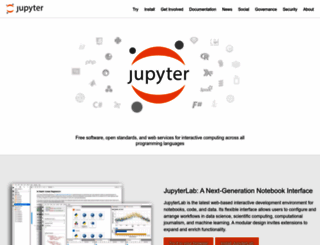Project Jupyter | Home
Page Load Speed
762 ms in total
First Response
12 ms
Resources Loaded
240 ms
Page Rendered
510 ms

About Website
Visit jupyter.org now to see the best up-to-date Jupyter content for China and also check out these interesting facts you probably never knew about jupyter.org
The Jupyter Notebook is a web-based interactive computing platform. The notebook combines live code, equations, narrative text, visualizations, interactive dashboards and other media.
Visit jupyter.orgKey Findings
We analyzed Jupyter.org page load time and found that the first response time was 12 ms and then it took 750 ms to load all DOM resources and completely render a web page. This is quite a good result, as only 15% of websites can load faster.